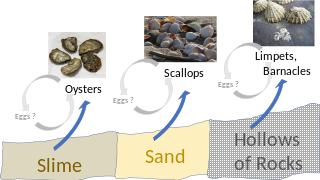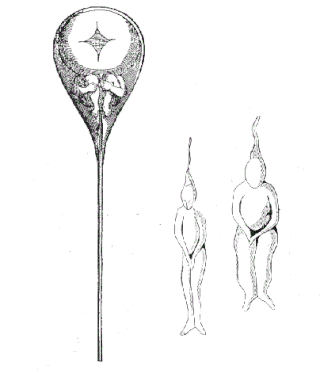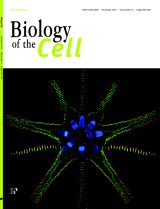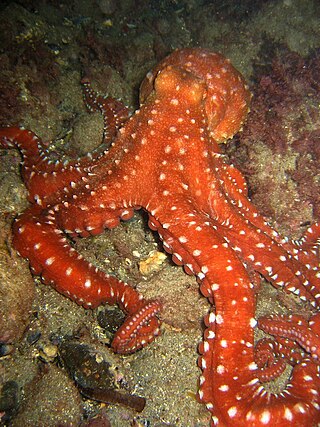Related Research Articles

Aristotle was an Ancient Greek philosopher and polymath. His writings cover a broad range of subjects spanning the natural sciences, philosophy, linguistics, economics, politics, psychology, and the arts. As the founder of the Peripatetic school of philosophy in the Lyceum in Athens, he began the wider Aristotelian tradition that followed, which set the groundwork for the development of modern science.

Heredity, also called inheritance or biological inheritance, is the passing on of traits from parents to their offspring; either through asexual reproduction or sexual reproduction, the offspring cells or organisms acquire the genetic information of their parents. Through heredity, variations between individuals can accumulate and cause species to evolve by natural selection. The study of heredity in biology is genetics.

Life is a quality that distinguishes matter that has biological processes, such as signaling and self-sustaining processes, from matter that does not. It is defined descriptively by the capacity for homeostasis, organisation, metabolism, growth, adaptation, response to stimuli, and reproduction. All life over time eventually reaches a state of death, and none is immortal. Many philosophical definitions of living systems have been proposed, such as self-organizing systems. Viruses in particular make definition difficult as they replicate only in host cells. Life exists all over the Earth in air, water, and soil, with many ecosystems forming the biosphere. Some of these are harsh environments occupied only by extremophiles.

In biology, epigenetics is the study of heritable traits, or a stable change of cell function, that happen without changes to the DNA sequence. The Greek prefix epi- in epigenetics implies features that are "on top of" or "in addition to" the traditional genetic mechanism of inheritance. Epigenetics usually involves a change that is not erased by cell division, and affects the regulation of gene expression. Such effects on cellular and physiological phenotypic traits may result from environmental factors, or be part of normal development. Epigenetic factors can also lead to cancer.

Evolutionary developmental biology is a field of biological research that compares the developmental processes of different organisms to infer how developmental processes evolved.

Spontaneous generation is a superseded scientific theory that held that living creatures could arise from nonliving matter and that such processes were commonplace and regular. It was hypothesized that certain forms, such as fleas, could arise from inanimate matter such as dust, or that maggots could arise from dead flesh. The doctrine of spontaneous generation was coherently synthesized by the Greek philosopher and naturalist Aristotle, who compiled and expanded the work of earlier natural philosophers and the various ancient explanations for the appearance of organisms. Spontaneous generation was taken as scientific fact for two millennia. Though challenged in the 17th and 18th centuries by the experiments of the Italian biologists Francesco Redi and Lazzaro Spallanzani, it was not discredited until the work of the French chemist Louis Pasteur and the Irish physicist John Tyndall in the mid-19th century.

Embryology is the branch of animal biology that studies the prenatal development of gametes, fertilization, and development of embryos and fetuses. Additionally, embryology encompasses the study of congenital disorders that occur before birth, known as teratology.

Lamarckism, also known as Lamarckian inheritance or neo-Lamarckism, is the notion that an organism can pass on to its offspring physical characteristics that the parent organism acquired through use or disuse during its lifetime. It is also called the inheritance of acquired characteristics or more recently soft inheritance. The idea is named after the French zoologist Jean-Baptiste Lamarck (1744–1829), who incorporated the classical era theory of soft inheritance into his theory of evolution as a supplement to his concept of orthogenesis, a drive towards complexity.

Caspar Friedrich Wolff was a German physiologist and embryologist who is widely regarded as one of the pioneers of modern embryology.

Conrad Hal Waddington was a British developmental biologist, paleontologist, geneticist, embryologist and philosopher who laid the foundations for systems biology, epigenetics, and evolutionary developmental biology.

History of Animals is one of the major texts on biology by the ancient Greek philosopher Aristotle, who had studied at Plato's Academy in Athens. It was written in the fourth century BC; Aristotle died in 322 BC.

In religion and philosophy, ensoulment is the moment at which a human or other being gains a soul. Some belief systems maintain that a soul is newly created within a developing child; others, especially in religions that believe in reincarnation, believe that the soul is pre-existing and enters the body at a particular stage of development.

The history of genetics dates from the classical era with contributions by Pythagoras, Hippocrates, Aristotle, Epicurus, and others. Modern genetics began with the work of the Augustinian friar Gregor Johann Mendel. His works on pea plants, published in 1866, provided the initial evidence that, on its rediscovery in 1900's, helped to establish the theory of Mendelian inheritance.
Eva Jablonka is an Israeli evolutionary theorist and geneticist, known especially for her interest in epigenetic inheritance. Born in 1952 in Poland, she emigrated to Israel in 1957. She is a professor at the Cohn Institute for the History of Philosophy of Science and Ideas at Tel Aviv University. In 1981 she was awarded the Landau prize of Israel for outstanding Master of Science (M.Sc.) work and in 1988, the Marcus prize for outstanding Ph.D. work. She is a proponent of academic freedom, recognising that on such matters, "academic and political issues cannot really be kept apart", although she is not a proponent of simplistic solutions, and shows a preference to describe her own position.

In the history of biology, preformationism is a formerly popular theory that organisms develop from miniature versions of themselves. Instead of assembly from parts, preformationists believed that the form of living things exist, in real terms, prior to their development. Preformationists suggested that all organisms were created at the same time, and that succeeding generations grow from homunculi, or animalcules, that have existed since the beginning of creation, which is typically defined by religious beliefs.

Biology of the Cell is a peer-reviewed scientific journal in the field of cell biology, cell physiology, and molecular biology of animal and plant cells, microorganisms and protists. Topics covered include development, neurobiology, and immunology, as well as theoretical or biophysical modelling.

Evolutionary thought, the recognition that species change over time and the perceived understanding of how such processes work, has roots in antiquity—in the ideas of the ancient Greeks, Romans, Chinese, Church Fathers as well as in medieval Islamic science. With the beginnings of modern biological taxonomy in the late 17th century, two opposed ideas influenced Western biological thinking: essentialism, the belief that every species has essential characteristics that are unalterable, a concept which had developed from medieval Aristotelian metaphysics, and that fit well with natural theology; and the development of the new anti-Aristotelian approach to modern science: as the Enlightenment progressed, evolutionary cosmology and the mechanical philosophy spread from the physical sciences to natural history. Naturalists began to focus on the variability of species; the emergence of palaeontology with the concept of extinction further undermined static views of nature. In the early 19th century prior to Darwinism, Jean-Baptiste Lamarck (1744–1829) proposed his theory of the transmutation of species, the first fully formed theory of evolution.

Transgenerational epigenetic inheritance is the transmission of epigenetic markers and modifications from one generation to multiple subsequent generations without altering the primary structure of DNA. Thus, the regulation of genes via epigenetic mechanisms can be heritable; the amount of transcripts and proteins produced can be altered by inherited epigenetic changes. In order for epigenetic marks to be heritable, however, they must occur in the gametes in animals, but since plants lack a definitive germline and can propagate, epigenetic marks in any tissue can be heritable.

Aristotle's biology is the theory of biology, grounded in systematic observation and collection of data, mainly zoological, embodied in Aristotle's books on the science. Many of his observations were made during his stay on the island of Lesbos, including especially his descriptions of the marine biology of the Pyrrha lagoon, now the Gulf of Kalloni. His theory is based on his concept of form, which derives from but is markedly unlike Plato's theory of Forms.

Alternatives to Darwinian evolution have been proposed by scholars investigating biology to explain signs of evolution and the relatedness of different groups of living things. The alternatives in question do not deny that evolutionary changes over time are the origin of the diversity of life, nor that the organisms alive today share a common ancestor from the distant past ; rather, they propose alternative mechanisms of evolutionary change over time, arguing against mutations acted on by natural selection as the most important driver of evolutionary change.
References
- ↑ Heard, Edith (December 13, 2012). "Épigénétique et mémoire cellulaire: Leçon inaugurale prononcée le jeudi 13 décembre 2012". Épigénétique et mémoire cellulaire. Leçons inaugurales (in French). Collège de France. ISBN 9782722602328 . Retrieved June 10, 2016– via OpenEdition Books.
- ↑ Engelstein, Stefani (2003). "Reproductive Machines in E.T.A Hoffmann". In Henn, Marianne; Pausch, Holger A. (eds.). Body Dialectics in the Age of Goethe. Amsterdam: Rodopi. p. 173. ISBN 9789042010765 . Retrieved June 10, 2016.
- ↑ Baxter, Alice Levine (March 1976). "Edmund B. Wilson as a Preformationist: Some Reasons for His Acceptance of the Chromosome Theory". Journal of the History of Biology. 9 (1): 29–57. doi:10.1007/bf00129172. PMID 11615633. S2CID 44857190.
- ↑ Conference, Spallanzani's Biological Contributions 200 Years After His Death. New York: Columbia University. October 29, 1999. Archived from the original on April 12, 2001. Abstracts of papers presented.
- ↑ Mayr, Ernst (1998). "What Is the Meaning of 'Life'?". This Is Biology: The Science of the Living World. Cambridge, MA: Harvard University Press. p. 11. ISBN 978-0-674-88469-4 . Retrieved June 10, 2016.